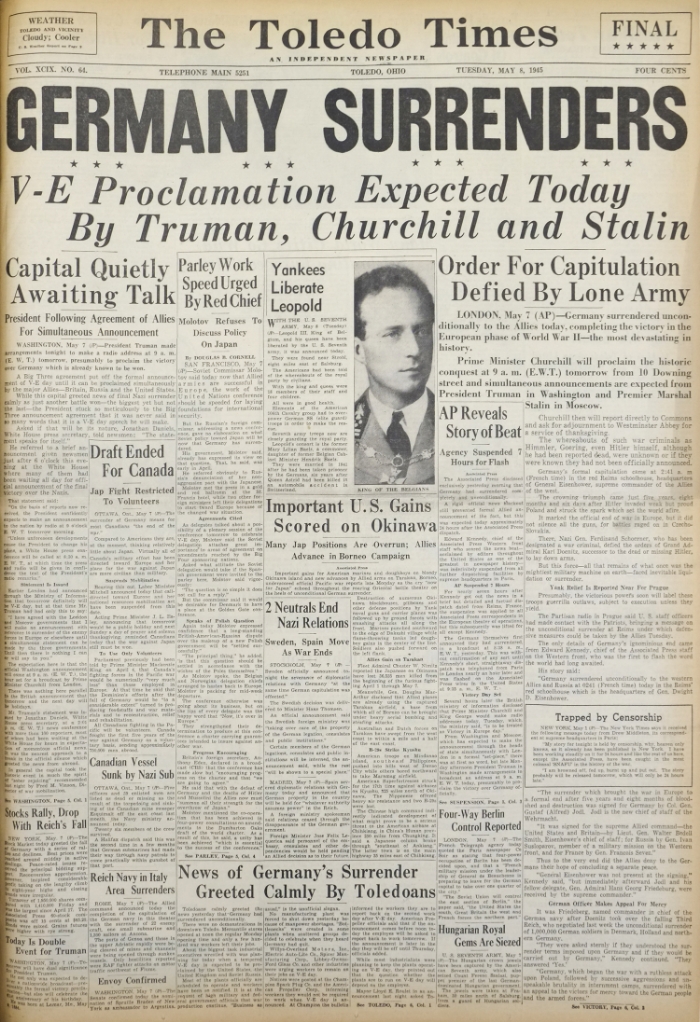
Mom was working full-time on this newspaper at the time of this edition.
Decades before there was Google, there was “the City Desk.” It wasn’t a digital resource; it was an actual person picking up a phone and dutifully looking for an answer to any reasonable question you posed. “How does the population of Indiana (where I grew up) compare to that of our neighboring states—Ohio and Illinois?” “What’s the current men’s world record for the mile—and who holds it?” “What show ran the most nights in Broadway history?” “How did John F. Kennedy’s father make his money?” “How much of a signing bonus did the Cincinnati Reds pay Pete Rose?” “How many Nazis fled Germany to live in Argentina?” Sports, entertainment, local, national, international—it didn’t matter. My mom and dad told us that the people (mostly “guys”) working at any City Desk at any newspaper took great pride in knowing everything—or at least being able to quickly put their fingers on the answer to almost anything.
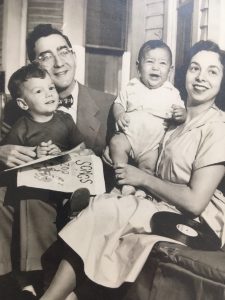
Our family when there were just the first two kids, probably end of 1950. Mom is holding me and Dad is holding Leon,
Some of the stuff we asked, you might find in an encyclopedia. But it might give you an answer that was out-of-date. We owned a set of the World Book encyclopedia in our home, but when we had a question, Mom and Dad told us to call the City Desk. Those guys had answers that were never out of date. You would reach a friendly person—usually a woman–at the switchboard first, and our parents taught us to say, “city desk, please.” The next person who picked up sounded like they were in a hurry, and did not try to sound especially friendly, and was usually a male. But friendly or not, I never had one of them hang up upon hearing my eleven- or twelve- or fourteen-year-old voice. They apparently had too much pride to do that. And they usually came back with an answer within a couple of minutes. Who knows what sources they consulted! It seemed like they just asked around the Newsroom until they found someone among them who knew the answer. To everything!
Dad loved to tell the story of his own most memorable answer to a question when he was at the other end of the phone, just a few months out of college and working at the Morning Free Press in Easton, PA. One evening, the Pennsylvania sky was filled with strange shooting lights. There was a flurry of phone calls to the paper. The switchboard operator funneled one of the calls to young Irv’s desk. He explained to a woman in response to her question that it was the Aurora Borealis, but she insisted on knowing more. What did that mean? What was the significance? What was she to make of it?
In his senior year in high school (1936-37), Dad had played the part of Death in a production of “Death Takes A Holiday,” a play originally produced on Broadway in 1934. Receiving that call in 1942, he still remembered all his lines. Not knowing what further explanation might satisfy the caller, he began quoting from the play: “Think if you will of infinity. Think of sound that goes floating on forever.”
“Does that answer your question?” he asked. After a pause she said, “I guess so. Thank you.” And she hung up.
I don’t recall Mom, in a similar fashion, reciting any specific stories about her time at the City Desk. But even more than Dad, she was the one who promoted our belief in the deep well of knowledge to be found among the denizens of any city daily. She was the first one who would encourage us to call the City Desk at the Indianapolis Times or Star or News. She nurtured that credo from her several years working as a reporter for the Toledo Times.
My peers in the 1950s and 60s were unfamiliar with this remarkable font of facts and figures available to anyone with a telephone. (I guess you could call it an early form of dial-up service.) They didn’t know the story behind our Mom and Dad, and how they got together.
When Beatrice Borman of Toledo, Ohio, met Irving Fink, of Newton Falls, Ohio, they had a great deal in common. Both were Jewish but not Orthodox. Each of them had immigrant parents. Bea heard mostly Yiddish in her home and Irv mostly Polish. Both had parents who had been motivated by economic factors to settle in the places they chose. Irv’s parents chose to settle in Newton Falls because a recently built steel plant was likely to translate to many people with wages in their pockets interested in buying clothing and shoes; they would open Fink’s Fashion Shop on the main artery of town, Broad Street, with an apartment overhead in which to live. Bea’s mother Geitel (or “Gertie”) moved from her parents’ home in Toronto at age 16 to live in Toledo with her married sister Sadie, because Sadie could help her find employment in a garment factory. Bea’s father, whom family and friends called by his last name, “Borman,” met Geitel not long after she arrived, and they would marry when she was eighteen. By the time they met, he was a well-established twenty-something, with his own horse-and-cart, operating as a junk dealer—or as Geitel would later describe it in a letter, “working in the rags and metals business.”
From these respective environments, Mom and Dad emerged as budding intellectuals. Bea studied Latin all four years in high school, and then all four years at Toledo University. She was Editor-in-Chief of her Yearbook at Scott High School. So impressed were they with her talents, that after she began college, her high school principal recruited her to take over their Spanish class for a few months. Bea had never studied Spanish—and they knew that. But they were confident she could teach anything, and she did, studying the textbook to stay a few days ahead of her students.
Irv, meanwhile, became a darling of his community from the time he memorized the 15-line poem, “In Flanders Fields,” and recited it on the town green before the gathered citizenry on Decoration Day (later known as Memorial Day). He had not yet gone to first grade; he was five years old. In every succeeding year until he went off to college, he recited this elegiac work by the Canadian World War I veteran, John McCrae. He played the clarinet in high school and by the time he met Bea also the saxophone. During college, one of the ways he earned money (besides ironing other men’s slacks and shirts) was by enlisting a pianist, a violinist, and a tenor vocalist into a group that mixed music, song, and the recitation of poetry. They got hired to play at the parties of women’s clubs around Evanston, Illinois. (Hoping to become an actor, he was studying in Northwestern University’s School of Speech).
It may sound as though these two talented, socially engaged, and animated young people might make a good match. But something would have to bring them together; that something turned out to be their mutual involvement in journalism. Irv Fink had become a soldier, stationed at the Erie Proving Grounds just across the Ohio border in Pennsylvania. He had just recently left that job as a reporter in Easton, so he was recruited to write and edit a Camp bulletin to promote spirit and morale. The Army gave him a typewriter, which he ended up lugging in his duffel bag on a convoy to England, and then eventually to France after D-Day, and all the way home to Ohio. My older brother Leon still has it.
But Private Fink (eventually, Lieutenant Fink) gained something much more valuable than the typewriter as a consequence of being asked to run the base newsletter: He got to meet Bea Borman. Dad had made friends with a guy from Toledo. Seeing that Irv was crafting the camp newsletter, the guy suggested, “hey, I knew a girl in high school you might really like. You might have a lot in common.” He told Irv about Bea being the Yearbook editor and now working as a newspaper reporter. That led Dad to ask Bea out one Saturday night for a blind date.
It turned out that Bea was busy, having already made plans to see a movie with a female friend. “That’s the worst news I’ve heard since the fall of France,” was the line he used to get her to cancel her plans. Which sounds like the kind of hard-boiled line a guy on the City Desk would use—or at least, a guy on the City Desk as written by Dashiell Hammett. In any case, it worked. She cancelled her plans, they had dinner together, and apparently, she concluded It was worth it, because their second date was for breakfast the next morning. They had a few more opportunities to spend time together in person, and then he was off on that convoy, and overseas for two years, and they continued their relationship by writing letters.
Once Irv was finally stateside—not demobilized yet but free for 10 days—their love had blossomed through those letters and they pulled together a wedding in Toledo on extremely short notice. They didn’t have even 10 days, because Rosh Hashanah, the Jewish New Year, would make some of the days unavailable. They scurried around making one quick decision after another. Mom had taught Sunday School in a Reform congregation, so fortunately, the rabbi from that congregation was willing to come back from his vacation to perform the ceremony. They arranged that the out-of-town guests would join them for dinner the night before at a Chinese restaurant. Dad’s two brothers were still in the Pacific, so he got his sister’s husband Marty to be his Best Man. Mom got another female reporter to be her Maid of Honor; Oakley would have just two days to find a dress. And the bridal dress? After finding nothing worthy on a trip to Cleveland, and despairing of the lack of time amidst all the other pressing decisions, she called a neighbor, a Catholic family whose daughter had been married a couple of months earlier. Bea and she were the same size, and my mother happily walked up the aisle and looked beautiful wearing that borrowed white dress.
Ultimately, there were many facets of their backgrounds and lived experiences besides newspaper writing that bound my parents together. When Dad died in 2015 at age 95, they were in their seventieth year of marriage.
I wonder if, in having us call the City Desk, one or both of our parents had an inward smile, remembering one more reason to be deeply grateful to that breed of journalists. With all the decisions they were making so rapidly in planning that wedding on September 2, 1945– about the rabbi, and the food, and the flowers, and the dresses and shoes, and the transporting of various family members and guests—one thing they completely forgot was to obtain a marriage license. On the Sunday morning of their nuptials, they had nothing.
But Bea was on the City Desk. It was her job to know all the people who worked at City Hall in Toledo. You think this young bride, in the midst of her preparations on this most special day, could make a couple of phone calls, and get one of her sources to go and unlock the building, and get the necessary forms and get the right signatures on those forms? You bet she did!
Dale Borman Fink retired in 2020 from Massachusetts College of Liberal Arts in North Adams, MA, where he taught courses related to research methods, early childhood education, special education, and children’s literature. Prior to that he was involved in childcare, after-school care, and support for the families of children with disabilities. Among his books are Making a Place for Kids with Disabilities (2000) Control the Climate, Not the Children: Discipline in School Age Care (1995), and a children’s book, Mr. Silver and Mrs. Gold (1980). In 2018, he edited a volume of his father's recollections, called SHOPKEEPER'S SON.


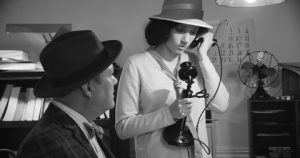
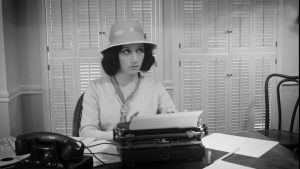
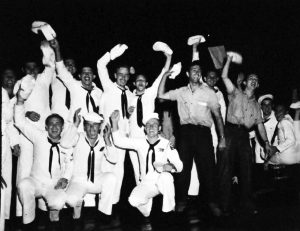

I learned so much from this story, Dale. I never knew that you could call the City Desk and get answers to almost anything.
You’ve shared a great love story between your parents, the genesis of their careers, a newspaper story; so many stories rolled into one. I’m sure their forced separation during the war, and their need to correspond, let them get to know one another at a deep level.
My parents also married quickly in Toledo, in 1946, in a small family ceremony at a hotel. Just a few months ago I found two photos from the event. But I don’t think it had the drama that you described for your parents’ wedding. Calling the City Desk was a great idea and clearly got the job done!
As we’ve discussed, my mother’s family is from Toledo. My mother went to Scott High (then on to Ohio State, but she is older – she graduated in 1935). My grandfather’s jewelry store was at 612 Adams Street. I still have cousins there. One wrote me, in response to this story, that the Toledo Blade now prints only twice a week, the rest is online. And so it goes.
Wow, this is such a wonderful response to the piece; I am truly grateful. I am convinced that, although your mother was a few years ahead of my mom at Scott High, there must have been some Jewish weddings or other events where they crossed paths! BTW my parents’ wedding was at the Commodore Perry Hotel; perhaps among your relatives, someone knows which hotel your parents used. And BTW the rabbi’s name was Leon Feuer. (I only know all this because of the stories my dad wrote down in his last 10 years, which I collected and published posthumously in a volume called Shopokeeper’s Son.)
The mighty Toledo BLADE publishes only twice a week! What is the world coming to?
DALE, the Commodore Perry! I had forgotten it’s name, but that is where my parents married as well. Thank you for that memory jolt. But they lived in Detroit already (my mother moved there during the war to work for the USO and lived with her older sister). They married in Toledo because my grandparents were there (my father’s father was deceased, his mother had been institutionalized for over 20 years and would die about 11 months later).
You can see a photo of the Stein family (my mother’s family) from 1946 in last week’s story.
So sweet to find out we have this connection–our parents being married at the same hotel in Toledo, Ohio. Since my mother’s mother, Geitel, was one of 9 sisters (no brothers) who all began in Toronto, a couple of them ended up in Detroit. So we had Detroit cousins just like you had Toledo cousins. I recall one of Mom’s cousins, Stanley Green, ended up as a mail carrier in Detroit.
I agree, it is rather wonderful that we share this connection, and then even into Detroit! My Grandmother Belle Stein was the oldest of 9 siblings as well. Many of her sibs wound up in Detroit too (as well as most of my father’s family, because his uncle was an officer of General Motors and called them all from St. Louis to work for GM). So we do share many connections, Dale.
What a great story, Dale. I thoroughly enjoyed both the journalism angle (ha, ha, try calling a “City Desk” now) and the story of your parents’ courtship and wedding. When my mother’s mother came to the United States from what is now Ukraine, she was supposed to head to Toronto to stay with “Canadian cousins” but somehow that got changed and she ended up in New York City.
What a great story, Dale! I loved reading about your parents’ connection through their love of journalism. Wish I had known I could call the city desk as a kid. We didn’t even have encyclopedias in our home. Your story perfectly captures the era of the Greatest Generation. I truly enjoyed reading it.
And it’s a good thing she did or we’d have no Dale to tell this wonderful story about his journalistic parents!
The questions asked of the City Desk remind me of the summer I worked in a public library and filled in for the reference librarian while she was on vacation. I wish I had keep notes on the varied, sometimes humorous questions I was asked!
Dana, thanks for sharing your experience. I wish I could recall the actual questions we asked–but the ones I gave are approximations of the type and variety of our questions. My brother Leon, after reading the piece, also reminds me that we learned we could ask for the “Sports desk” at night when we didn’t want to stay up for the 11 0’clock news, wanted to know the results of a game or event that otherwise we might not find out about until the next day!
Great story Dale. I had no idea the City Desk existed, let alone was a source for random information. Like Dana, I learned that reference librarians could be called however. Loved the way the City Desk connection was the resource that produced the marriage license–you wove that in perfectly. And thanks for the story of your parents’ lives. They both sound like bright and interesting people who were a terrific match for each other. How wonderful that your dad wrote down their story, and that you published it. Their courtship through letters reminded me of how my parents also got to know each other over a distance–the power of the written word is indeed mighty!
Very nice. One of the best things about a newsroom is the camaraderie. Above the din, you can shout out a question — about spelling, about geography, anything — and someone will have an answer. We did get some calls like that when I worked as a reporter. And when I had a question none of my fellow reporters could answer, I called the local library.